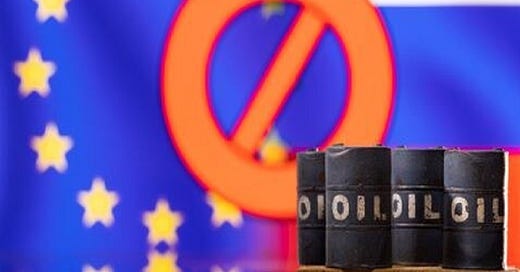This policy embodies the US-led West’s concept of the so-called “rules-based order” wherein double standards are arbitrarily applied in order to advance the West’s interests. On the one hand, these countries claim to support free trade, while on the other, they’re threatening to sanction those who continue to purchase Russian oil at the market price.
The West plans to enforce its price cap of $60 per barrel on Russian oil beginning 5 December. The stated intent of meddling in this aspect of the oil market is supposedly to deprive Russia of the funds that it requires to continue its special operation in Ukraine. This dramatic move is being undertaken after the West’s sanctions all this year failed to achieve that same objective, but it’s likely to have unpredictable consequences.
Before forecasting what they could be, it’s important to inform the reader about the proposed price cap’s enforcement mechanisms. Those that continue to import Russian oil above that price aren’t allowed to use Western services like insurance and shipping for facilitating those transactions otherwise they’ll be sanctioned. This suggests that Western governments can simply monitor those companies to see who’s using them for what end after 5 December in order to decide whether it violates their rules.
About those, this policy embodies their concept of the so-called “rules-based order” wherein double standards are arbitrarily applied in order to advance the West’s interests. On the one hand, these countries claim to support free trade, while on the other, they’re threatening to sanction those who continue to purchase Russian oil at the market price. Therein lies one of the first consequences from this policy that the West didn’t foresee, namely that it discredits its soft power.
Second, capping the price of Russian oil is unlikely to bankrupt the Kremlin, let alone influence the course of its special operation in any way. Regarding the former prediction, this is due to the Kremlin receiving record revenues this year in spite of sanctions due to the surge in energy prices, while the latter is accounted by the fact that its leadership considers this campaign to be defending the integrity of its national security red lines in Ukraine after NATO crossed them there.
The third unpredictable consequence is that the global oil market is being radically reshaped as a result of the looming price cap. Although Russia has already lost 90% of the European market, it’s compensating with increased exports to Asia-Pacific countries like India, which has imported literally fifty times more oil than last year. Meanwhile, Russia’s forced departure from the European market left a void that the US filled after its oil exports there surged by 52.2%.
Fourth, the radical reshaping of the global oil market brought about by the West’s political meddling might also radically reshape the global gas one as well to the US’ benefit too. The EU was pressured by the US into reducing its import of Russian gas and replacing that resource with more expensive LNG from its NATO ally. This is ironic since the stated intent of “decoupling” from Russia was to no longer be disproportionately dependent on any single supplier, yet now the EU is dependent on the US instead.
The subject of dependence brings the analysis along to the fifth consequence connected with the upcoming price cap, and it’s that Turkiye could become an alternative route for Europe’s informal continued imports of Russian oil. A report in November from the Finland-based Center for Research on Energy and Clean Air argued that Turkiye has been selling refined Russian oil to the EU all this year. If true, then this route could help the bloc meet demand without becoming too dependent on the US.
Sixth, all of the preceding insight suggests that the West’s policy won’t achieve its stated intent of bankrupting Russia and thus influencing its special operation, though it’ll likely nevertheless be spun as partially successful. To that end, the emerging military stalemate in Ukraine brought about by the West’s limited military-industrial capacity to keep up the scope, scale, and pace of support to its partner and the onset of winter will probably be publicly attributed to the price cap for political convenience.
To sum it all up, capping the price of Russian oil: discredits the West’s soft power by contradicting its free market principles; will radically reshape the global energy market; but won’t bankrupt the Kremlin or influence its special operation; yet it’ll probably be spun as responsible for any decrease in fighting. The US is also exploiting the EU’s compliance with this policy to profit by capturing the bloc’s markets. All told, it can be said that this upcoming move is therefore a major American power play in disguise.





It's so funny that despite allocating $858 billion to military, the US still has trouble manufacturing arms fast enough.
President #Putin on the EU's introduction of a ceiling on oil prices for Russian energy carriers: "We will not supply anything outside the framework of the contract. We will not do anything imposed by others."